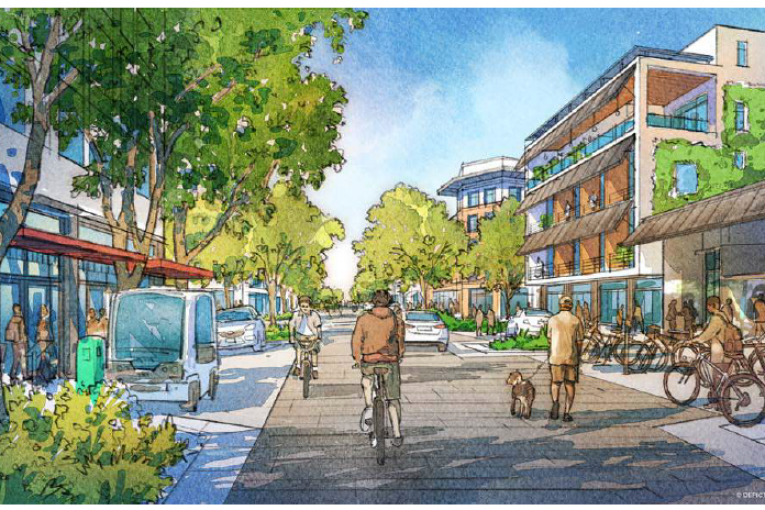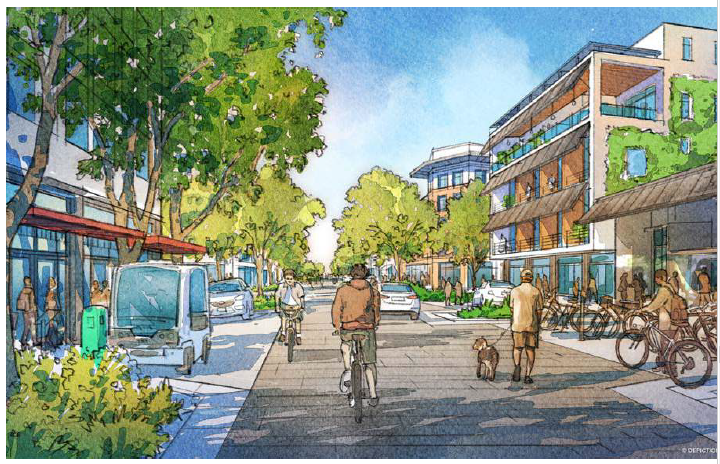

By David M. Greenwald
Executive Editor
Davis, CA – The argument has been made (and not just on here) that Davis is a community that doesn’t know what it wants to be in five years let alone 25 years. There is some truth to that.
Although as I noted yesterday, I think most people’s vision for Davis is a community similar to the one they moved to. My problem with that is that it is not a sustainable vision.
I understand that people like the ideal of a small, college town, with the small town character. They like a compact city surrounded by protected agricultural land.
But is that vision sustainable?
I was thinking, we often ask the question about city council candidate’s vision for Davis, so I pulled answers from the 2014 campaign:
John Munn: “My vision is that Davis be solvent and affordable. The City needs to get its financial house in order before taking on new projects and expenses. To do this, we need to solve problems rather than talk about them.”
Robb Davis: “My vision is an economically healthy city.” He mentions “City budgets in which the annual growth rates of costs and revenues match one another,” strong businesses, thriving downtown, neighborhood shopping and diversified transportation.
Rochelle Swanson: “My vision for Davis hasn’t changed since 2010 and I don’t think that the fiscal challenges that this community faces will prevent us from achieving our goals. My vision for Davis is a city that continues to be among the best, most forward-thinking places to live in the world.”
Sheila Allen: ““Growth control policies” for residential development are an asset because (1) housing usually doesn’t pay for the services they generate (2) urban sprawl generates infrastructure costs that saddle the public with debt service and maintenance costs, versus smart infill growth, which I support.”
Daniel Parrella: “For the budget I would like to see some transparency… For economic development I want a city that is capable of supporting a business through all stages of its life cycle.”
Unfortunately, I did not ask that question in 2022. (That reminds me to reconsider the vision question for 2024). Instead, I asked for their top three priorities. It is pretty clear from 2014 that the priority focus was on the city budget, whereas that has now shifted.
Bapu Vaitla: “My top three priorities are affordable housing, climate resilience, and community cooperation.”
Dan Carson laid out the funding gap, severe housing shortage, and climate change.
Gloria Partida mentioned land use, economic development and affordable housing.
Kelsey Fortune laid out similarly planning, climate and fiscal responsibility.
Adam Morrill laid out roads and bike paths, urban forest, and affordable housing.
None of that of course constitutes a vision.
During one of the forums the candidates responded to a question on “what would you do in the future to ensure the city of Davis has a fair share of affordable housing?”
Bapu Vaitla said, “I would just say in terms of our vision overall, we need a general plan update. If we as a city do not say what the character of our city is as far as housing, what we want to see, then we won’t attract the kind of developers, nonprofit developers, affordable housing developers that fit that vision of equity and sustainability.”
Kelsey Fortune lamented that “there’s no vision coming from our community members for the city to follow. And that’s how you get to where you want to be, is you plan. We know we need more housing. How are we going to build it? Will we tell the community, hey, we need a plan that builds more housing and they tell us how we do it?”
Bapu Vaitla also noted, “We are in the middle of setting this 20-year vision for climate action and adaptation. And there are a lot of great elements in the plan. I appreciate the amount of detail that went into it, but also it lacks it lacks the boldness and vision we need.”
But it appears that they were not asked to come up with a specific vision for the future of Davis—even as we have engaged in planning and visioning for things like Climate Action, to a lesser extent housing (particularly through the General Plan update if it occurs), and the Downtown.
Those who lament that we lack a vision—and certainly not any kind of articulated, shared vision—have a point.
On the other hand, I kind of think we need to act now. I don’t think the housing crisis can wait. I certainly think we have waited—less as a community and more as a global entity—way too long to address the climate emergency.
That doesn’t mean we don’t need a vision. Far from it. It just means we can no longer afford to wait to fully develop that vision to act. We need to act in the short term and plan for the long term.


I certainly don’t expect Davis or any city/town to remain the same indefinitely. Things change over time. Every nation on Earth changes over time. Things change whether or not we agree with or like those changes. If you are unsatisfied with where you live, you can always move. Throughout my life I have moved roughly 8 times.
I don’t ask other people to do anything that I haven’t already done. I try to be both reasonable and practical in what I request others to do. In my mind those are marks of a good leader.
.
The problem with that vision is not only that it is not sustainable … it isn’t even a vision. It is merely a description.
So my question to you David (and anyone else that cares to weigh in), what is your Vision for Davis, and what is your plan for making that Vision fiscally and economically sustainable?
.
How does acting now, as you have proposed, move Davis forward … and even more importantly, how is the new state that Davis will have achieved going to be more sustainable than the current state?
Said another way, will “acting now” on housing only dig our currently deep hole even deeper?
Need housing. It takes a long time to approve and build housing in Davis.
David, your “need housing” retort sounds a lot like a person who has lost their job, has no income, and has a credit card with a substantial outstanding balance saying, “Let’s go shopping … and charge it!”
Davis doesn’t NEED housing. The current “missing middle” employees of Davis businesses who live outside Davis and commute to their jobs here in Davis will not be able to outbid the stream of Bay Area refugees looking to move to an ownership home in Davis. Even worse, the Davis developers don’t want to build the kind of $500,000 to $600,000 homes the “missing middle” can actually afford. So your “need housing” in the owner-occupied market doesn’t benefit people who already have a connection to Davis. All you have to do to confirm that is look at Cannery.
Regarding rental housing, the “missing middle” is also functioning at a financial disadvantage, but rather than losing to Bay Area refugees with more financial resources, UCD students with deep parental pockets are bidding up thepriceofrental housing and the “missing middle” is being squeezed out, So your “need housing” in the renter-occupied market doesn’t benefit people who already have a connection to Davis. All you have to do to confirm that is look at Sterling and Lincoln 40 and Nishi and Plaza 2555 to confirm that. The developers are following the money and building student rentals, not rentals for the “missing middle.”
Building on the credit card metaphor, housing costs the City more in annual expenses than it generates revenues from taxes.
Until we get our jobs picture in order … doing what Tim Keller has dreamed about in the other Vision thread … housing only makes the City’s fiscal picture worse than it already is.